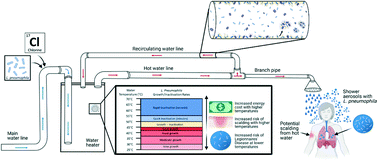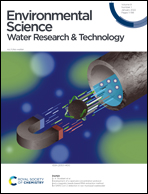Computational framework for evaluating risk trade-offs in costs associated with legionnaires' disease risk, energy, and scalding risk for hospital hot water systems†
Abstract
Legionella pneumophila are bacteria that when inhaled cause Legionnaires' disease (LD) and febrile illness Pontiac fever. As of 2014, LD is the most frequent cause of waterborne disease outbreaks due to drinking water exposure in the United States. The optimal temperature for the bacteria's growth is between 25–45 °C, and water heaters that are set within this range can become an environment for L. pneumophila to grow. The recommended water heater temperature varies across organizations, from 60 °C to kill L. pneumophila bacteria to 49 °C to prevent scalding and minimize energy costs. To evaluate these trade-offs, we have developed a computational framework for evaluating an optimal water heater temperature set point for reducing cost and health risks. This framework uses a quantitative microbial risk assessment (QMRA) to assess the risk of infection from a single shower aerosol exposure in terms of disability-adjusted life years (DALY) and costs. The model demonstrated that the optimal water heater temperature set point for reducing cost and health risks was 55 °C or 48 °C for a common configuration of an electric water heater used in a hospital setting, using a subclinical infection or clinical severity infection dose response model, respectively. Based on these preliminary results, we expect this modeling framework will be able to provide useful insight into the optimal water heater temperature set point for hospitals based on their specific premise plumbing system configurations and constraints and can inform computational tools used to make site-specific decisions.



 Please wait while we load your content...
Please wait while we load your content...